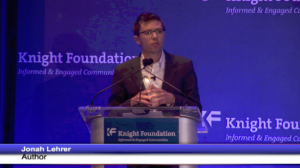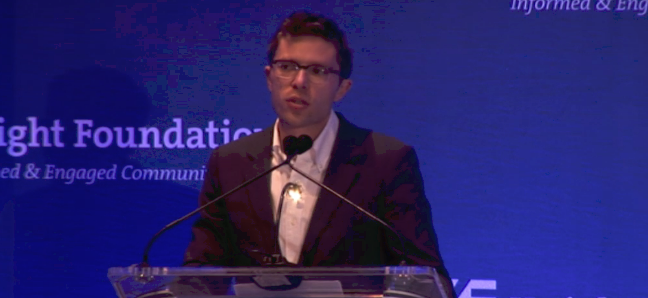Jonah Lehrer’s Non-Apology and Non-Explanation
 For people who are interested in plagiarism, Jonah Lehrer’s case is a fascinating one and, theoretically, it could hold some insight into the difficult question of why people choose to plagiarize.
For people who are interested in plagiarism, Jonah Lehrer’s case is a fascinating one and, theoretically, it could hold some insight into the difficult question of why people choose to plagiarize.
For all of Lehrer’s ethical failings, Lehrer does have significant knowledge in neuroscience and decision-making, those being among his areas of focus, and if anyone could cast light on why people decide to plagiarize, fabricate and commit other ethical violations, Lehrer would be the perfect person.
On Tuesday, at an event sponsored by the Knight Foundation, Lehrer gave his first speech (or any lengthy comment) on the topic of his misdeeds. Unfortunately though, all Lehrer offered was an apology that failed to apologize for most of his misdeeds and an explanation that didn’t explain much at all.
The speech was a study in contradictions. It was one where Lehrer claims to take responsibility while indirectly comparing his misdeeds to unintentional mistakes by others, one where he claims that there are no excuses for what he did and summarily offers excuses and half-baked solutions and one where Lehrer says that an apology can never restore trust in his name but seems to be making a pitch to get a new writing job.
When the dust settled, Jonah Lehrer did nothing to clear up the confusion surrounding his misdeeds and did nothing to diffuse the anger directed at him. If anything, he only muddied the waters more and reignited the outrage against him.
Worst of all, he may have put the Knight Foundation, a non-profit that specializes in innovation in journalism, the crossfire.
To understand why this is, we have to take a closer look at Lehrer’s speech and why it fell so far short.
A Brief Recap
 To briefly recap (and oversimplify) the Jonah Lehrer scandal, in June of last year it was revealed that Lehrer had reused content from previous columns and books in his more recent works for The New Yorker.
To briefly recap (and oversimplify) the Jonah Lehrer scandal, in June of last year it was revealed that Lehrer had reused content from previous columns and books in his more recent works for The New Yorker.
Lehrer, who had just started a new job as a staff writer for the magazine, was already a well-known journalist and was a frequent contributor to Wired Magazine, The New York Times, The Boston Globe and was also the author of three popular books.
Initially, it appeared that Lehrer would likely survive the scandal with most people trying to decide if Lehrer’s reuse was an offense at all, with some calling it self-plagiarism and others calling it smart writing. However, it was soon thereafter discovered that Lehrer had fabricated several quotes from Bob Dylan in his book “Imagine” and Lehrer quickly resigned.
However, the investigation into Lehrer’s work continued and other issues began to pop up including allegations of plagiarism, fabrication, quotation issues and more. In August, when Wired completed its investigation into Lehrer’s work, it found that, out of a sample of 18 works, 17 had problems including 14 with recycling issues, 8 with plagiarism issues (either press release or traditional plagiarism) and 8 with factual issues, including quotation issues and other factual errors.
When it was all said and done Lehrer, who had been a prolific freelance journalist, had no place that would publish his work and Lehrer seemed to sink into the shadows, that is, until Tuesday.
Reviewing Lehrer’s Speech
 Though this debunking won’t be anywhere near as thorough as the one I did for Jayson Blair’s book, it’s worth noting that Lehrer’s speech has many of the same problems and to see that, we must first recap it.
Though this debunking won’t be anywhere near as thorough as the one I did for Jayson Blair’s book, it’s worth noting that Lehrer’s speech has many of the same problems and to see that, we must first recap it.
First, Lehrer opens up the speech saying:
“For those who do not know who I am, let me give you a brief summary: I’m the author of a book on creativity that contained several fabricated Bob Dylan quotes. I committed plagiarism on my blog, taking without credit or citation an entire paragraph from the blog of Christian Jarrett. I plagiarized from myself. I lied to a journalist named Michael Moynihan to cover up the Dylan fabrications.”
Lehrer continued saying that he sought out scientific explanations for his misdeeds, but claims that the reasons he found were just “excuses” and he wanted to accept responsibility for his misdeeds. However, he instead shifted to talking about other researchers who have made honest mistakes, such as the FBI misinterpreting evidence and how “Standard Operating Procedures” (SOPs) are designed to prevent or mitigate such mistakes.
He said that, if he were allowed to write again, he would implement his own SOPs, including having all of his work fact-checked (and assumedly plagiarism-checked) and that he needed rules because he didn’t trust himself not to be arrogant.
He concluded his speech with a quote by Bob Dylan, one Lehrer notes he actually said, about how failure is both terrible and necessary. He expressed hope that he could write again some day and that, even if he isn’t, he hopes he’s able to grow from this and become a better person.
However, Lehrer’s comments in the FAQs makes it clear that he’s not sure he has become wiser for his ordeal noting that, “It’s not enough that I’ve been humbled. I still may be arrogant.”
All in all, Lehrer’s speech was not very well received, especially by Twitter. The conference dedicated a screen to his left to displaying tweets of the event, most of which were extremely critical of Lehrer.
The Problems with Lehrer’s Speech
Basically, nothing in Lehrer’s speech was complete. His recollection of what happened was inadequate, his reasons given were irrelevant and his steps for improvement were completely off-target.
In short, Lehrer only grew his problems with this speech.
Looking at his recollection of what happened, he greatly minimized his misdeeds. His opening statement only mentioned his recycling of content, one instance of plagiarism and one instance of fabrication. Of course, as the Wired investigation showed, the problems were much more pervasive.
In the Q&A afterward, Lehrer said that he would he hadn’t thought of publishing an accounting of his misdeeds, saying instead that his work had been “thoroughly investigated and fact-checked online.” Still, in this speech, he failed to give even passing mention to many of the discoveries in that investigation or lend any help to it.
As for his reasons for plagiarism, Lehrer initially said that he wasn’t going to discuss the reasons he found, calling them excuses, but when pressed highlighted what he called “arrogance” as a motivating factor, further saying that “Being smart, having a high IQ can actually make you more vulnerable…”
This excuse not only comes across as patronizing, but it doesn’t explain the plagiarism. Arrogance explains why one feels they wouldn’t get caught. Arrogant people believe they’re smarter than everyone else and that they can get away with whatever they’re doing, it doesn’t explain why they feel that they should break the rules in the first place.
Furthermore, as mentioned in my previous article on Jayson Blair, the jailbreak problem shows that these excuses apply equally to others who don’t plagiarize and fabricate. Many journalists are smart and arrogant without breaking the rules, what made Lehrer the exception? He never answered that one.
Worst of all though was his solution to the problem. Saying that he couldn’t trust himself to not be arrogant, he proposed an SOP of his own, one where all of his work would be fact-checked before publication.
The problem, as Craig Silverman at Poynter pointed out, is that SOPs are designed to protect against people make accidental errors, not intentional transgressions. The annoying beep your car makes when you forget to put on your seat belt only protects you if you want to put your seatbelt on and forgot. It’s completely useless if you hate seat belts and refuse to wear them.
Furthermore, it shifts the responsibility of Jonah Lehrer’s ethics to the person doing the fact checking. Lehrer is no longer responsible for fabricated or plagiarized material that gets through, instead, it’s the responsibility of someone else.
If Lehrer’s self control is so bad that he can’t stop himself from plagiarizing and fabricating without someone checking behind him, he shouldn’t be publishing at all. No fact checker can be perfect and no other journalist gets such a benefit to aid in his self control.
In short, if this is what Lehrer needs to do ethical work, he needs to never write again. It’s that simple.
Bottom Line
Jonah Lehrer’s speech was a study of contradictions and, for the most part, a waste of time. For most of his talk, Lehrer simply referred to his misdeeds as “errors” or “mistakes” and compared them to others who had made genuine mistakes, even if they had disastrous consequences.
But Lehrer didn’t make mistakes in the sense that he used the word. Unlike the FBI agents he cited, he didn’t merely misread a fingerprint. Lehrer’s crimes were not that he remembered information as true when it was false or misunderstand how to cite content, his deeds were intentional.
More rules can’t protect him because he already broke established rules. It’s like trying to stop existing criminals by passing more laws. If he can’t follow the basic rules of journalism, there’s little reason to believe an SOP wouldn’t be circumvented the same way.
Lehrer’s speech has nothing to offer and the only reason it’s better than Blair’s book is that it wasted less of the viewers’ time.
Perhaps the greatest tragedy in Lehrer’s speech is that news that the Knight Foundation gave Lehrer a $20,000 honorarium to speak at the event, something the organization now realizes was a mistake. This poor decision has brought a lot of bad press and controversy to the foundation, which strives to promote innovation in journalism.
Though a more robust discussion of this honorarium and the ethics of rewarding plagiarists with lucrative deals will have to wait, that will be the subject of a future post I do on the iThenticate blog, it’s clear that the Knight Foundation is just another entity hurt by the misdeeds of Jonah Lehrer.
And that seems to be the story of Lehrer, his “mistakes” constantly hurting those who believed in him, supported him and loved him.
Video
Want to Reuse or Republish this Content?
If you want to feature this article in your site, classroom or elsewhere, just let us know! We usually grant permission within 24 hours.
